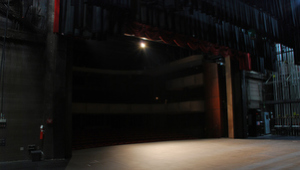
Photo by Max Wolfe, made available under CC BY 2.0
Marina Carr’s 1979-set middle-Irish play ambles through a year in the family dynamics between four generations of women, exploring the hope and disappointment of romance, the comfort and frustrations of sisterhood and the question of women’s freedom of identity within their relationships.
The play is shouldered by eight actors, all of which are excellent – a tight-knit ensemble each with their own distinct characters.
Gentle cello music plays as a wistful Millie (Beth Sharrock) enters a homely cottage lounge as if to examine ancestors’ relics in a dusty attic, setting the precedent for the evening. Millie – Mai’s daughter – frames vignettes from Mai’s life with poetic narration while remaining an observer for the most part. Sharrock’s delivery is lulling and entreating, charmingly reminiscent of Laurie Lee’s Cider With Rosie.
Beryl Nairn’s Mai emanates maternal warmth and youthful vitality. She is a woman seeking an extraordinary life, full of potential and buzz. Her liveliness is particularly poignant against Damian Fynes’s bitter apathy as her husband Robert. The pair, along with the rest of the cast, are wholly convincing in their relationships, demonstrating painfully recognisable bonds that both move and mollify.
“D’ya think I’m Paradise material?”
Sophie Buckley and Elizabeth Elsworth give notable performances as Aunt Julie and Grandma Fraochlán respectively, the latter of which forms a cannily cheeky cornerstone of this “house of mad, proud women”, though that is not to understate the acute tenderness with which each character’s individual concerns are felt. Jessica Murray’s Beck is an open-armed, infectiously loving singleton with low self-esteem. Helen Sant’s Connie is exactly the sister you need in a crisis, though she has unexplored dreams of her own. Vivienne Clare’s Agnes is heartrendingly delicate despite her and Julie’s misguided protective natures.
“It’s not fair they should teach us desperation so young… Or if they do, they should never mention hope.”
The Mai is not without its tragedies, however small. Each heartache and frustration is a waking pinch for those with dysfunctional family histories. Men are bemoaned but absent except for Robert who, himself, is a reluctant ‘visitor’ in the house. Women are let down, trapped, abandoned, left wondering why. The heaviest sadness comes from each generation of women being neglected by their mothers, who are all distracted by an endless, unrewarding search for love – a family pattern still playing out for Millie and her own son.
Mai’s cat-like, rebellious attempts to win back her husband’s attention when it is too late are hilariously, heartbreakingly relatable. Angry knicker removal and a calming round of the Connemara Cradle Song are highlight moments of female camaraderie and defiance in the face of life’s rejections.
These are interspersed with narration that wades out further than it should, perhaps, into an unprecedented thread about the beautiful and ominous legend of Owl Lake. We are also asked to invest our imagination in the sympathy of characters that we never meet, along with learned accents and confusing age disparities, though some edge is thankfully minimised by Natalie Heijm’s subtle make-up work.
Carr’s script is a soothing, sombre work in observational drama from a simpler time, embracing digressive conversation and the feeling of time spent with relatives during the holidays; people of varying beliefs and priorities making the most of being stuck together. It is a play that steeps and simmers. It has the tone of a more adult bedtime audiobook of The Illustrated Mum. It could benefit from some cuts and focus, but the poetry and humanity are worth your time. You may leave wanting to call your mum, your sister, your daughter, your aunt.
The play is showing at 41 Monkgate, York, until 19th March 2016. Tickets are £12/10 available from York Theatre Royal box office on 01904 623568.



